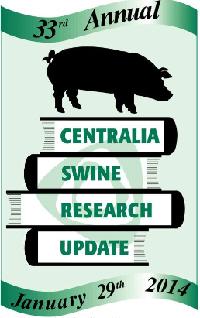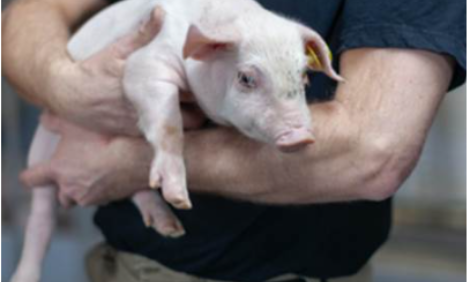



Impact of Nursery Diet Quality and Fish Oil Supplementation on Growth Performance of Pigs
Feeding trials at the University of Guelph reveal that feeding poor-quality protein diets adversely affected the growth of the pigs during the early nursery period but not in the later stages, and fish oil supplementation improved feed conversion over corn oil. Researchers presented these results at the 33rd Centralia Swine Research Update.
Expensive, high-quality protein ingredients have been included in nursery diets to improve growth performance of newly weaned pigs, according to S. Hooda of the University of Guelph.
At the University of Guelph, reported S. Hooda, it has been demonstrated that feeding low-cost and less complex nursery diets reduced growth performance during nursery phase only, but did not affect growth performance up to market weight and carcass quality at slaughter (Skinner et al., 2014).
However, the immune response was compromised in pigs fed less complex diets (Levesque et al., 2013) and growth performance was reduced during a disease challenge (Skinner et al., 2014). Inclusion of immune response modulating ingredients, such as fish oil, may be used in less complex diets to improve growth performance.
Thus, this study was conducted to study the effect of five per cent fish or corn oil inclusion in high and low protein quality nursery diets on growth performance of pigs during the first eight weeks post-weaning.
Materials and Methods
The study was conducted at the Arkell Swine Research Station, University of Guelph, Guelph.
A total of 120 Yorkshire pigs (five barrows and five gilts per pen; three pens per treatment) were weaned at a mean body weight of 6.25kg and 21±3 days of age. At weaning, pigs were assigned to one of four dietary treatments in a 2×2 factorial arrangement based on diet protein quality (High versus Low) and five per cent oil (corn versus Fish) supplementation.
Nursery diets were provided in a three-phase feeding programme with Phase I, II and III diets being fed for seven, 14 and 21 days, respectively.
High diets contained plasma protein, soybean isolate (highly digestible purified protein), fishmeal and crystalline amino acids.
Low diets included mainly soybean meal as a source of protein.
Thereafter, all the pigs were fed a common grower diet for 14 days.
Pigs were weighed individually and per pen feed usage was determined every seven days until the end of trial (day 56).
Data were analysed statistically as a randomized block design with repeated measures using the MIXED procedure of SAS (V 9.2 SAS Inst. Inc., Cary, NC) with pen as the experimental unit. Results were considered significant at P<0.05 and tendencies reported P<0.10.
Results
There were no interactive effects of diet protein quality and oil supplementation on growth performance. Body weight, average daily gain (ADG), average daily feed intake (ADFI) and feed efficiency (Gain:Feed; G:F) were affected by both protein quality and oil supplementation (Table 1).
| Table 1. Effect of nursery diet quality (High vs Low) and 5% oil (Corn vs Fish) supplementation on growth performance of starter pigs |
|||||||
| Treatment | P-value | ||||||
|---|---|---|---|---|---|---|---|
| Diet protein quality | Oil | ||||||
| High | Low | Corn | Fish | SEM | Quality | Oil | |
| ADG, g | |||||||
| Phase I; d0-7 | 138 | 100 | 127 | 110 | 20.0 | 0.011 | 0.170 |
| Phase II; d7-21 | 290 | 239 | 264 | 264 | 13.2 | 0.025 | 0.995 |
| Phase III; d21-42 | 593 | 582 | 574 | 602 | 18.3 | 0.689 | 0.306 |
| Nursery, d0-42 | 422 | 385 | 395 | 411 | 8.75 | 0.019 | 0.222 |
| Grower, d42-56 | 794 | 817 | 791 | 820 | 21.4 | 0.460 | 0.365 |
| Overall, d0-56 | 509 | 494 | 496 | 506 | 14.1 | 0.461 | 0.618 |
| ADFI, g | |||||||
| Phase I; d0-7 | 181 | 147 | 172 | 156 | 11.7 | 0.004 | 0.065 |
| Phase II; d7-21 | 491 | 423 | 469 | 445 | 8.8 | 0.006 | 0.085 |
| Phase III; d21-42 | 996 | 999 | 1.030 | 965 | 22.0 | 0.935 | 0.071 |
| Nursery, d0-42 | 555 | 523 | 557 | 521 | 9.35 | 0.038 | 0.028 |
| Grower, d42-56 | 1,498 | 1,514 | 1,507 | 1,505 | 48.8 | 0.821 | 0.974 |
| Overall, d0-56 | 898 | 877 | 902 | 873 | 22.4 | 0.526 | 0.401 |
| G:F | |||||||
| Phase I; d0-7 | 0.748 | 0.652 | 0.712 | 0.688 | 0.057 | 0.083 | 0.606 |
| Phase II; d7-21 | 0.589 | 0.565 | 0.560 | 0.594 | 0.023 | 0.482 | 0.328 |
| Phase III; d21-42 | 0.586 | 0.568 | 0.543 | 0.611 | 0.047 | 0.317 | 0.004 |
| Nursery, d0-42 | 0.750 | 0.721 | 0.695 | 0.775 | 0.046 | 0.042 | 0.002 |
| Grower, d42-56 | 0.532 | 0.541 | 0.526 | 0.546 | 0.016 | 0.695 | 0.387 |
| Overall, d0-56 | 0.566 | 0.563 | 0.550 | 0.579 | 0.007 | 0.742 | 0.021 |
Feeding Low diets decreased (P<0.05) average daily gain as compared to feeding High diets during Phase I, II, and the nursery period (Phase I to III).
There was no effect of Fish oil inclusion on average daily gain during the nursery period and grower phase. Average daily feed intake (Phase I, II nursery period) were lower (P<0.05) in pigs fed Low diets than those fed High diets.
Pigs fed Fish oil in nursery diets had lower (P<0.05) average daily feed intake during nursery period and tended to have lower (P< 0.10) average daily feed intake during phase I, II and III.
Pigs fed High diets have greater (P=0.05) Gain:Feed than those fed Low diet during phase I and nursery (0 to 42 days).
Similarly, Fish oil fed pigs had improved Gain:Feed (P<0.05) during Phase III, the nursery period and overall as compared to Corn oil-fed pigs.
Discussion and Implications
These results indicate that feeding Low-quality protein nursery diets compromised growth of pigs during the early nursery period. However, during nursery Phase III and the grower phase, average daily gain and average daily feed intake were not different between High and Low quality protein nursery diets.
These results further strengthen the concept that diet protein quality is critical during the early nursery phase (Phases I and II) to stimulate feed intake and – possibly – the immune system. Thereafter, diet protein quality can be reduced to lower feed costs, while pig performance can be maintained.
Independent of diet protein quality, fish oil supplementation improved Gain:Feed, which may be explained by the effect of fish oil supplementation on the pig’s response to immunological stress (Liu et al., 2003; Gaines et al., 2003). However, concluded Hooda, more research is needed to understand the dose response of fish oil at varying diet protein quality to optimise both growth performance and the pig’s immune response, while lowering feed cost.
References
- Gaines A.M., J.A. Carroll, G.F. Yi, G.L. Allee and M.E. Zannelli. 2003. Effect of menhaden fish oil supplementation and lipopolysaccharide exposure on nursery pigs II. Effects on the immune axis when fed simple or complex diets containing no spray-dried plasma. Dom. Anim. Endo. 24: 353-365.
- Levesque C.L. E. Miller, J. Zhu and C.F.M. de Lange. 2013. Simple assessment of piglet robustness to nursery diet quality and feeding antibiotics. J. Anim. Sci. 9: S2 Abstract 90.
- Liu Y.L., D.F. Li, L.M. Gong, G.F. Yi, A.M. Gaines and J.A. Carroll, 2003. Effects of fish oil supplementation on the performance and the immunological, adrenal, and somatotropic responses of weaned pigs after an Escherichia coli lipopolysaccharides challenge. J. Anim. Sci. 81: 2758-2765.
- Skinner L.D., C.L. Levesque, D. Wey, M. Rudar, J. Zhu, S. Hooda and C.F.M. de Lange. 2014. Impact of nursery feeding program on subsequent growth performance, carcass quality, meat quality, physical and chemical body composition of growing-finishing pigs. J. Anim. Sci. Accepted.
Reference
Hooda S., N. Richmond, D. Wey, J. Zhu and C.F.M. de Lange. 2014. Research update: Impact of nursery diet quality and fish oil supplementation on growth performance of pigs. Proceedings of 33rd Centralia Swine Research Update. II-27–II-28.
June 2014








